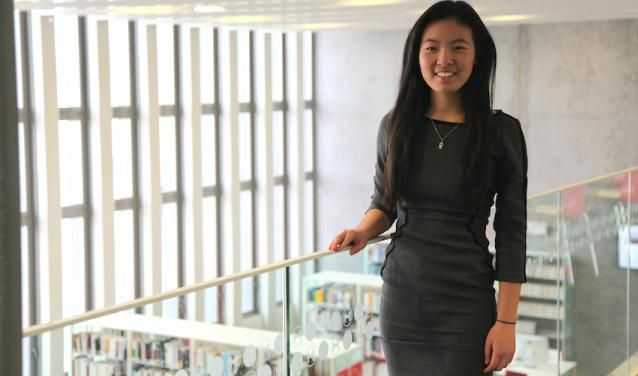Home>"The campus in Le Havre is really a place where the world meets! ”

28.04.2016
"The campus in Le Havre is really a place where the world meets! ”
Linda Xu is a first-year student taking the dual Bachelor’s degree programme between Sciences Po and UBC on the Le Havre campus. She was born in Qingdao, China, but she moved to Canada at the age of seven and has spent most of her life in Vancouver. When it came to choosing a university abroad, she applied to Sciences Po so she could gain an understanding of Europe-Asia relations.
Why did you choose to enrol in the dual Bachelor’s degree offered by Sciences Po and UBC?
I would like to work in a sector related to climate change issues. To be effective in this field, you need to have a comprehensive skill set that allows you to understand and negotiate with stakeholders from both the private and the public sectors.
The Sciences Po-UBC dual curriculum is ideal for acquiring these skills. In my two years on the Europe-Asia programme at Sciences Po, I will be studying Asia from a European and social sciences perspective, while I will gain a business perspective at UBC. In the end, I will graduate with a Bachelor of Social Sciences from Sciences Po and a Bachelor of Commerce from UBC.
What is student life like on the Le Havre campus?
There is never a dull moment here in Le Havre and in my view it is the most culturally enriching of the Sciences Po campuses. It is really a place where the world meets! Most students here have lived in many countries and have experienced several cultural backgrounds. This diversity makes you open your eyes wider; it makes you consider things in a way you would never have imagined and discover things you were not even aware of.
What do you usually do on weekends?
I am in the Le Havre debating society, so I spend a lot of my weekends debating and I often travel to other countries in Europe to meet the brightest students from peer universities. I have had some amazing opportunities to attend international debating competitions in Dublin, Prague, London, Copenhagen, and Oxford. I am also a member of the Korean dance group here on campus. I really enjoy it and I think it is a cool way to meet people.
Is there anything you found difficult to adapt to when you arrived in France?
I had to adapt to a different lifestyle of course, and the language barrier was significant. It was not easy to talk to the locals, even with my basic command of French. I wish I had acquired a better level of French before I arrived. It was rather frustrating not knowing enough French and not being able to take advantage of every opportunity.
Has anything surprised you about the courses at Sciences Po?
I have to say that the academic intensity at Sciences Po was a bit of surprise. Here you take six, seven or eight courses per semester, which means you have 22 to 30 hours of classes a week. To deal with the workload, and if you want to be able to do well in all the courses, you have to prioritise and to manage your time effectively.
However, although the studies are intensive, students at Sciences Po are really supportive. We share notes; we are not competitive. It is more about enjoying the opportunity to succeed academically. And I quite like it!
Related links
Learn more about the Europe-Asia undergraduate programme on the Le Havre campus
Learn more about our dual Bachelor's degrees with international partners